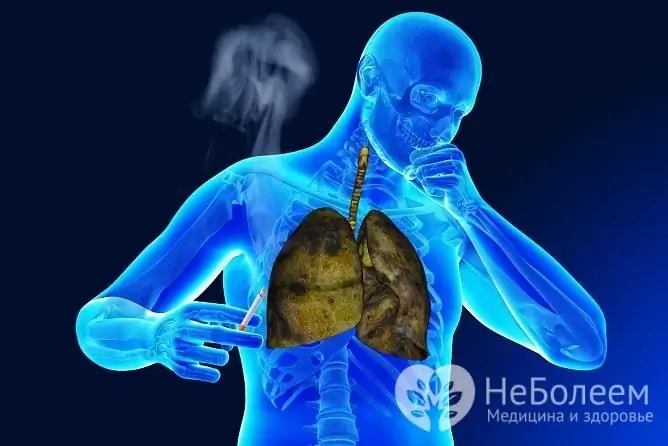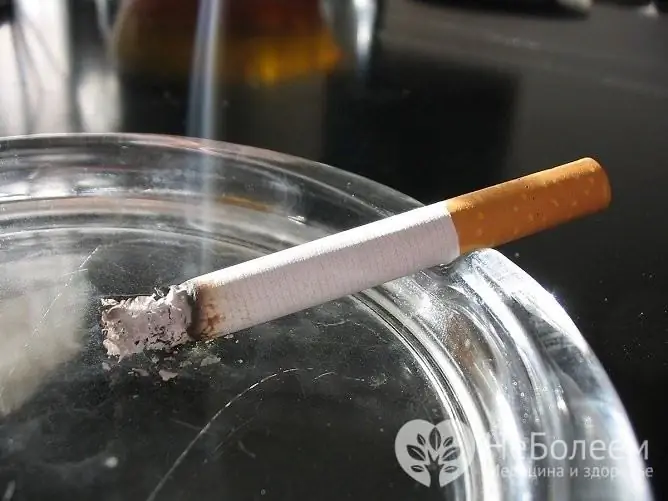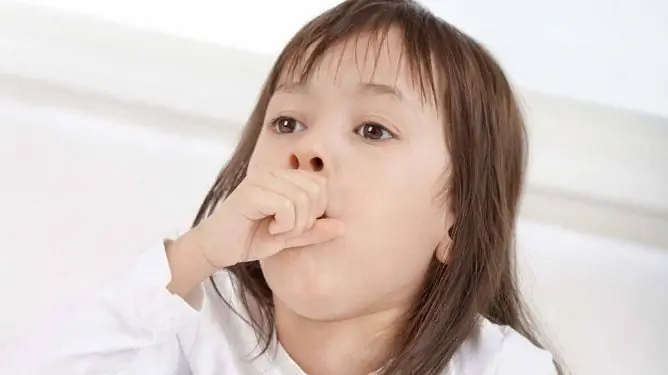- Author Rachel Wainwright wainwright@abchealthonline.com.
- Public 2023-12-15 07:39.
- Last modified 2025-11-02 20:14.
Smoker's cough: treatment, symptoms, complications
The content of the article:
- Symptoms
- Complications
- Smoker's cough treatment
- Rehabilitation
- Video
Smoking is the cause of a smoker's cough. A cough indicates that the activity of the ciliated epithelium is disrupted and the viscosity of the bronchial secretion increases. Excretion of phlegm is the body's struggle with poisonous resins and harmful substances that have got into it when inhaling smoke. On constantly irritated alveoli of the lungs of smokers, when poisonous substances and tar with smoke, more viscous mucus is formed, epithelial cilia lose their ability to clear the surface of the lungs, and a cough occurs.

Smokers' cough is the body's attempt to rid itself of toxic substances
Symptoms
Chronic cough caused by smoking develops in experienced smokers. It is especially pronounced in the morning hours, when a person begins to actively move after a night's rest. The main symptom is a moist cough that produces phlegm that may be discolored, gray, or greenish.
The appearance of such a cough in a person who smokes is not accompanied by fever, headache or nasal congestion, and it weakens over the course of the day. Usually this symptom does not bother the smoker much, and he does not pay enough attention to it, but in vain. It is easy to avoid the complications that can arise if you gradually limit the number of cigarettes you smoke or quit smoking once and for all.
Complications
If you do not take any measures and continue to smoke in the same amount, coughing can turn into a serious illness - chronic bronchitis. Over time, more mucus is formed, small bronchi become clogged, sclerotic changes in the deep layers of the bronchial walls occur, and their destruction. The respiratory system does not work in full and provokes problems in the digestive system and the circulatory system. Insufficient oxygen saturation of the human body leads to blockage of blood vessels, which affects the brain activity and the work of all its organs. There is no need to talk about normal human activity with such work of internal organs.
In addition, smokers are at very high risk of developing respiratory infections. Continuously maintained inflammation can eventually transform into a malignant process - lung cancer occurs in smokers 25 times more often than non-smokers. It should be remembered that households also suffer from a bad habit, since secondhand smoke is no less dangerous than active.
It is important that a diagnosis of the bronchi was carried out in a medical institution to determine the structure and condition of the respiratory system, this will help determine the method that will be effective at one stage or another of the disease. However, in order for the body to work normally, it is necessary, first of all, to get rid of tar and other carcinogenic substances entering the lungs.
Smoker's cough treatment
It does not make much sense to start treating a cough until a person gets rid of a bad habit, you can only alleviate his symptoms.
How to get rid of a smoker's cough? This is easy and difficult to do at the same time. If an adult has sufficient willpower, then such signs of malfunction in the body will lead to a decisive cessation of smoking. If willpower does not help, you can resort to aids that relieve the discomfort of nicotine hunger. These include nicotine patch, inhaler, pills, acupuncture.
As long as the cough is not very disturbing, and the person does not want to quit smoking, you can use electronic cigarettes. They do not have that destructive share of toxic substances, in particular, tar, which ordinary cigarettes contain. Reducing the number of cigarettes smoked per day and reducing the depth of smoke inhalation play a positive role.
How to treat a smoker's cough in the early stages? To facilitate the removal of phlegm, it is required to increase the intake of fluids in the form of natural vegetable or fruit juices, herbal teas, berry infusions, or plain water. Supports the human body in the fight against toxic substances strong immunity, the best way to strengthen which is a healthy lifestyle.
To reduce inflammation of the mucous membrane in smokers, the following are used:
- pharmaceuticals;
- folk remedies;
- homeopathic remedies.
Medicines selected by your doctor will help convert thick mucus into a liquid that is easier to evacuate from your airways. Syrups for cough marshmallow and licorice root significantly reduce inflammation of the mucous membranes of the bronchi. These are mucolytic drugs that help thin the abundant secretions from the bronchi. Bronholitin, Bromhexin, Lazolvan and others contribute to the rapid release of mucus.
Dragee with mint and menthol is a relatively safe and effective drug for coughs in smokers. Bactericidal and antimicrobial pharmaceutical forms contain essential oils that help the body by reducing inflammation. The drugs are Septolete, Faringosept, Strepsils and others.
When choosing homeopathic remedies, you need to take into account the general condition of the body. If there is no additional runny nose or other symptoms other than cough, then Ipecacuanu or Gedelix are prescribed. When, in addition to coughing, there is a subfebrile temperature, Gepar sulfur is prescribed. With an additional loss of strength, use the Conium. The advantage of this method is the absence of side effects in humans, which usually occur when taking pharmaceutical drugs. Plant extracts provide additional therapy for the smoker's body. However, the use of homeopathy as a therapy in this case is not recognized by official medicine, therefore, a person takes responsibility for its application.

The main condition for the treatment of chronic cough is the refusal of the smoker from the bad habit.
In folk recipes for coughs, infusions of anti-inflammatory herbs are used: thyme, chamomile, linden and the addition of honey. Apply inhalations with essential oils, use heating in baths and saunas. Exercise and massage are effective means of strengthening the immune system, and they also help to cough up mucus better.
It is necessary to take into account the fact that with a complete cessation of smoking at first the cough does not stop, it will take about one and a half months on average before it decreases, and then disappears completely.
Rehabilitation
After quitting smoking and a course of therapy, complete rehabilitation usually occurs within six months. The following measures can speed up the body's recovery:
- moderate but regular exercise;
- daily stay in the fresh air;
- hardening;
- proper nutrition.
Video
We offer for viewing a video on the topic of the article.

Anna Kozlova Medical journalist About the author
Education: Rostov State Medical University, specialty "General Medicine".
Found a mistake in the text? Select it and press Ctrl + Enter.






